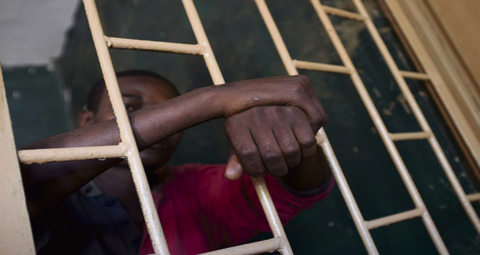BY Ian Dunn | April 10 | ![]() 0 COMMENTS
0 COMMENTS ![]() print
print

Faith is a light of hope in the darkest of places
IAN DUNN shares a very personal reaction to his visit to a DR Congo prison while in the country with SCIAF marking the charity’s 50th anniversary year
Bukavu is a city of more than a million souls on the eastern border of the Democratic Republic of Congo. It is at the heart of a region that has been wrecked by war and violence for a generation and, for much of my recent trip to see SCIAF’s work here, I met with those who have been fighting back against the poverty and war—the lawyers attempting to bring justice to a lawless land, the women farmers supported by the Scottish Catholic International Aid Fund who are helping to feed and heal their communities. This year’s SCIAF Wee Box campaign, with fund matching from the Department for International Development (DFID), will help those women build a better future for themselves and their children.
Just before we left the DR Congo, however, I wanted to see the other side of this suffering. To meet with some of the men who are being held responsible in prison for so much woe.
Hard time
Bukavu Central Prison is a large square building of red-brick walls and a large open central exercise yard in the middle. It sits right in the centre of the city. The Belgians built the prison nearly a century ago during a time when they were accused of plundering the area. Since the Belgians’ departure, the region’s history of corruption and chaos have meant its ancient cells are stuffed full of prisoners—both ‘innocent’ and ‘monstrous.’
A few months before we arrived in DR Congo, hundreds of prisoners escaped in a mass break-out that ended in a gun battle in Bukavu’s streets yet there are still more than a thousand prisoners in this prison. We met one of them, Ruhune Kwigomba. He is 25 and had been in the prison for nine months. Though his case hadn’t been settled yet, he had been charged with raping a young girl. He said he had assaulted her but does not admit to raping her.
Mr Kwigomba is vehement about his innocence.
“I expect to be released,” he said. “Even my accuser knows that I will be freed at the end.” He was willing to talk about the horror of conditions inside Bukavu jail and, although his story brought to mind the old saying ‘there’s no guilty men in jail,’ I have no doubt he is being punished.
“I live in very hard conditions,” he said. “In my cell there are 129 other men. We sleep on the floor. We have a barrel for our natural needs.”
Within the prison there is a strict hierarchy among the inmates and he says he is at the bottom of it.
“The other inmates discriminate against me. I am useless. I have nothing to give them,” he said. “They always insult me, say my skin looks like the skin of a toad. If I die, no one will mourn me. I’ve been attacked several times. On the first day I was here, they wanted to test my strength and threw me down but, because I’m slim and flexible, I was able to avoid being badly hurt.”
He told us that that recently there had been a death in the next cell.
“We heard about it, someone died, but I didn’t even see the body; it disappeared quickly,” he said. “I wonder how I live here, I think it is only by the grace of God.”
Conditions
After speaking with Mr Kwigomba, we are invited to tour the prison. We are shown through a huge cast iron gate into a central courtyard.
As the guards are dressed just like the prisoners, there is no obvious way to tell them apart. As the gate slams shut behind us I am suddenly very aware of the stories I’ve heard about these prisoners. About the rebel leaders who raped hundreds of women, the men who have killed children, slaughtered whole villages. There are many eyes on us. They are not welcoming.
We are shown a cell. It is the size of a classroom. Over a hundred men are locked in here at 4pm every afternoon. The doors are not unlocked until the next morning. There are no windows. There is a barrel for a toilet. It smells vile. In high summer, when the heat can reach 30 degrees, the stench is impossible to imagine.
A chaplain’s insight
We are being shown around by the prison chaplain, Fr Adrien Cishugi. A tiny priest in a baseball cap, he is endlessly cheery amid the misery. He greets the
prisoners with a hugs. He has a small cuddly duck toy attached to his keyring that he grasps throughout our visit.
He tells me that the ‘youngest inmates is 13 and the oldest 86.’
“Most of the work is listening to the detainees,” he said. “We also organise things for the prisoners, there is sport, and language courses, IT, knitting and embroidery. We are also trying to help people who are arbitrarily detained, that is to say imprisonment without trial. In case of death, we act too. We remove the body from often inhumane conditions. If the family is identified, we try to let them have the body for a funeral.”
He shows us the small chapel with clear pride.
“We often have 300 for Mass here,” he said. “I then get between 30 and 50 for the Sacrament of forgiveness.”
The atmosphere in the prison becomes increasingly hostile during our visit. When we move for cell to cell, some of the inmates hiss at us. We leave. Outside Fr Cishugi embraces us laughing. He works with people who have done terrible evil in conditions of shocking deprivation but his commitment is undimmed.
Many of men he works with would seem to many to be beyond redemption, their crimes so monstrous they cannot be comprehended. Yet the priest makes no such distinction between those he works with. In the face of such mercy and compassion the only appropriate reaction is awe.
Bukavu Prison is the darkest place I have ever been. There is terrible evil there and suffering we cannot understand. Yet even there, there was hope, a hope lit by the light of Faith.
— It is time to return the contents of your Lenten Wee Box to SCIAF. Visit www.sciaf.org.uk










